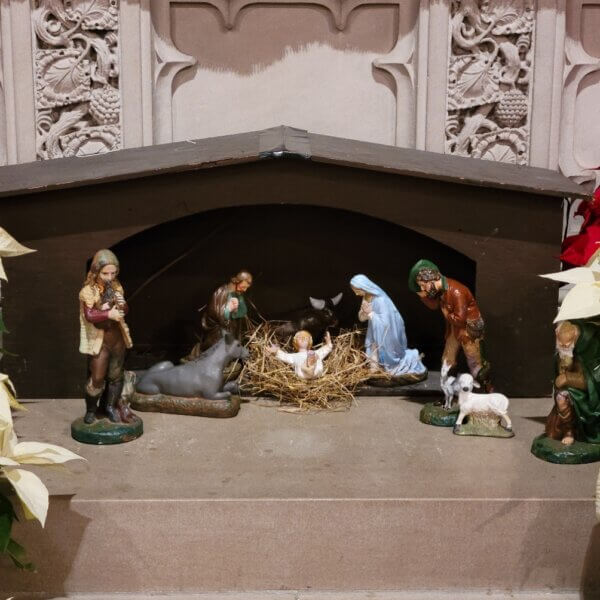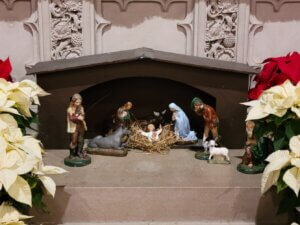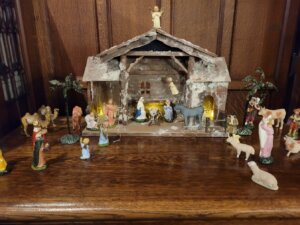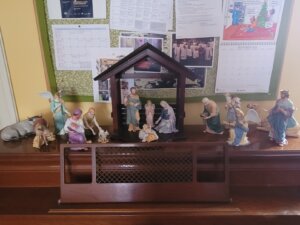
This Is Our Story
 Our Christmas gospel reading tonight — and most of our common cultural memory of Jesus’ birth — comes from the nativity story in the Gospel of Luke. Luke’s gospel is the basis of most Christmas stories, movies, hymns, songs, and pageants. It’s Luke’s gospel that gives us the story we treasure, and that we’ve all grown up with — even if we didn’t always go to church. Jere and I spent last week with Aubrey and Nick, our daughter and son-in-law in Atlanta, helping them settle into their new house and get ready for our new grand-baby coming in February.
Our Christmas gospel reading tonight — and most of our common cultural memory of Jesus’ birth — comes from the nativity story in the Gospel of Luke. Luke’s gospel is the basis of most Christmas stories, movies, hymns, songs, and pageants. It’s Luke’s gospel that gives us the story we treasure, and that we’ve all grown up with — even if we didn’t always go to church. Jere and I spent last week with Aubrey and Nick, our daughter and son-in-law in Atlanta, helping them settle into their new house and get ready for our new grand-baby coming in February.
Sunday morning, we sat together for the 9:00 family service at All Saints’ Episcopal Church, where we raised our family and were actively involved for the 35 years or so before Jere and I retired and I started divinity school in New Haven. Like Emmanuel, All Saints’ was also built around 1902, and while the exterior is very different, All Saints’ looks a lot like Emmanuel on the inside, with a red apse — in All Saints’ case, with ornamental stenciling instead of the figurative murals. Sunday morning, the Christmas Pageant took the place of the readings and the sermon, with older children reading, and the children’s choir and the congregation singing our responses to this story that holds all of our tenderest Christmas memories — O little town of Bethlehem, What child is this, Angels we have heard on high, and after Jesus was born, Go tell it on the mountain.
As I listened to the most familiar, oldest story that I know — part of the very fabric of my life, I had a strange sensation, almost like the sound of cards shuffling in my head as the years rolled back: I was 23 years old, just starting law school, watching children who could now be grandparents themselves enact the ancient story. Then 29, expecting our son Judson, marveling at how heavily pregnant Mary could walk from Nazareth to Bethlehem when I could hardly make it into church from the parking lot. Suddenly it was 2000, during our “No Stress Pageant” years, and I was standing in the Narthex with a team of moms tying bits of fur and shepherds’ cloaks on our own littles as they processed two by two up the aisle as the ancient story was read. Then 48, when our kids were acolytes, singing in the choir, or finding a seat in the standing room only crowd by being what we called a “police mom,” robed up and sitting with the cherubs’ choir on the chancel, wiping noses and keeping the peace. Memories and stories washed over me — connections with the past and hopes for the future — lived experience and deep connection with God and with the story that we all make together. I suddenly became aware of tears running down my cheeks, watching as this year’s Mary and Joseph travel to Bethlehem to be counted for the census, and knowing that this is my story too.
All Belong At the Manger
 Even if you only come to church on Christmas, and even if this is your very first time — think about whether this could be true for you too. Because we all belong at the manger. That’s the very point of this story that is imbedded in our hearts, our carols, our favorite movies, and our deepest, oldest, and tenderest family and cultural traditions. This is all of our story. Both Matthew’s and Luke’s gospels make it clear that Mary is a particular, human woman. She’s betrothed but unmarried, likely no more than 15 years old, and not from a priestly family. Jesus’ adoptive father, Joseph, is a particular, human man. The stories stress that they’re not super-human, royal, aristocratic, or wealthy. And the heavy overlay of empire makes the story relatable to us at every step.
Even if you only come to church on Christmas, and even if this is your very first time — think about whether this could be true for you too. Because we all belong at the manger. That’s the very point of this story that is imbedded in our hearts, our carols, our favorite movies, and our deepest, oldest, and tenderest family and cultural traditions. This is all of our story. Both Matthew’s and Luke’s gospels make it clear that Mary is a particular, human woman. She’s betrothed but unmarried, likely no more than 15 years old, and not from a priestly family. Jesus’ adoptive father, Joseph, is a particular, human man. The stories stress that they’re not super-human, royal, aristocratic, or wealthy. And the heavy overlay of empire makes the story relatable to us at every step.
Think of this: Bethlehem is not Mary’s hometown. Joseph, we are told, is descended from Bethlehem, the House of David. Joseph is betrothed to Mary, and their betrothal, and the Roman legal system, required that they both report to Bethlehem to be registered because it is Joseph’s ancestral home. That has nothing more to do with Mary, or her miracle pregnancy, than Joseph himself does. Whether this governmental registration is for tax purposes, military defense, or immigration controls the gospel does not tell us. But it’s really unlikely that Mary and Joseph are being counted to be sure that they have fair representation and a political voice in the Roman Empire. In Luke’s gospel, God upends all of this. God surprises Mary, Joseph, and probably most of all, the Emperor Augustus, by fulfilling God’s purposes with the birth of God’s son in Bethlehem, the local government where Joseph owed a duty to the Roman Empire, and Mary therefore owed a derivative duty as his betrothed, totally disrupting the Roman chain of command.
It’s certainly not the Roman Emperor or the Roman governor who comes to greet the new baby Jesus. Instead, an angel of the Lord gets the word out to the shepherds — out in the fields, and not inside the city limits of Rome’s political subdivision of Bethlehem. And the shepherds were not Roman officers. They were family members, sometimes even children, tending the most valuable assets a family had. Then there was the multitude of angels — so many little angels coming up the aisle this past Sunday morning! We don’t get an exact angel count in the gospel, but surely a thousand angels at least — show up at Jesus’ birth to praise God and worship. God inverts the power paradigm of Rome right in Rome’s own jurisdiction and under Rome’s nose — and it’s a long time before the empire even figures it out.
To Bethlehem
 After seeing this, the shepherds confer among themselves, and then they also head in to Bethlehem to welcome the baby Jesus. And then an army of God’s representatives shows up inside Bethlehem, breaking through all the trappings of the Roman empire’s temporal jurisdiction. Those who turned toward Bethlehem, as Luke’s gospel expresses it, were not exactly on the Ancient Near East A-list. None of those who showed up at the manger would have had a motorcade, classified information clearance, or a security detail. They came to Bethlehem to the humble cribside of a newborn baby — the ultimate inversion of power. And remember the shepherds? They left and told everyone they saw that ALL were welcome to this baby shower for God born in human skin.
After seeing this, the shepherds confer among themselves, and then they also head in to Bethlehem to welcome the baby Jesus. And then an army of God’s representatives shows up inside Bethlehem, breaking through all the trappings of the Roman empire’s temporal jurisdiction. Those who turned toward Bethlehem, as Luke’s gospel expresses it, were not exactly on the Ancient Near East A-list. None of those who showed up at the manger would have had a motorcade, classified information clearance, or a security detail. They came to Bethlehem to the humble cribside of a newborn baby — the ultimate inversion of power. And remember the shepherds? They left and told everyone they saw that ALL were welcome to this baby shower for God born in human skin.
Connecting with this story gives us all a place, wherever we’re coming from, and wherever we are in our own journeys. As we read from the prophet Isaiah, this promise comes from the earliest days of the people of Israel: The people who walked in darkness have seen a great light; those who lived in a land of deep darkness–on them light has shined. All of us, and all around us, is included in this story:
Let the heavens rejoice, and let the earth be glad;
let the sea thunder and all that is in it; *
let the field be joyful and all that is therein.Then shall all the trees of the wood shout for joy.
Let’s all follow the star and turn toward the prince of peace and the light of the world, and bring our biggest hopes and our wildest, holiest dreams — the very, very best of us — to the story we’re living with God. Amen
